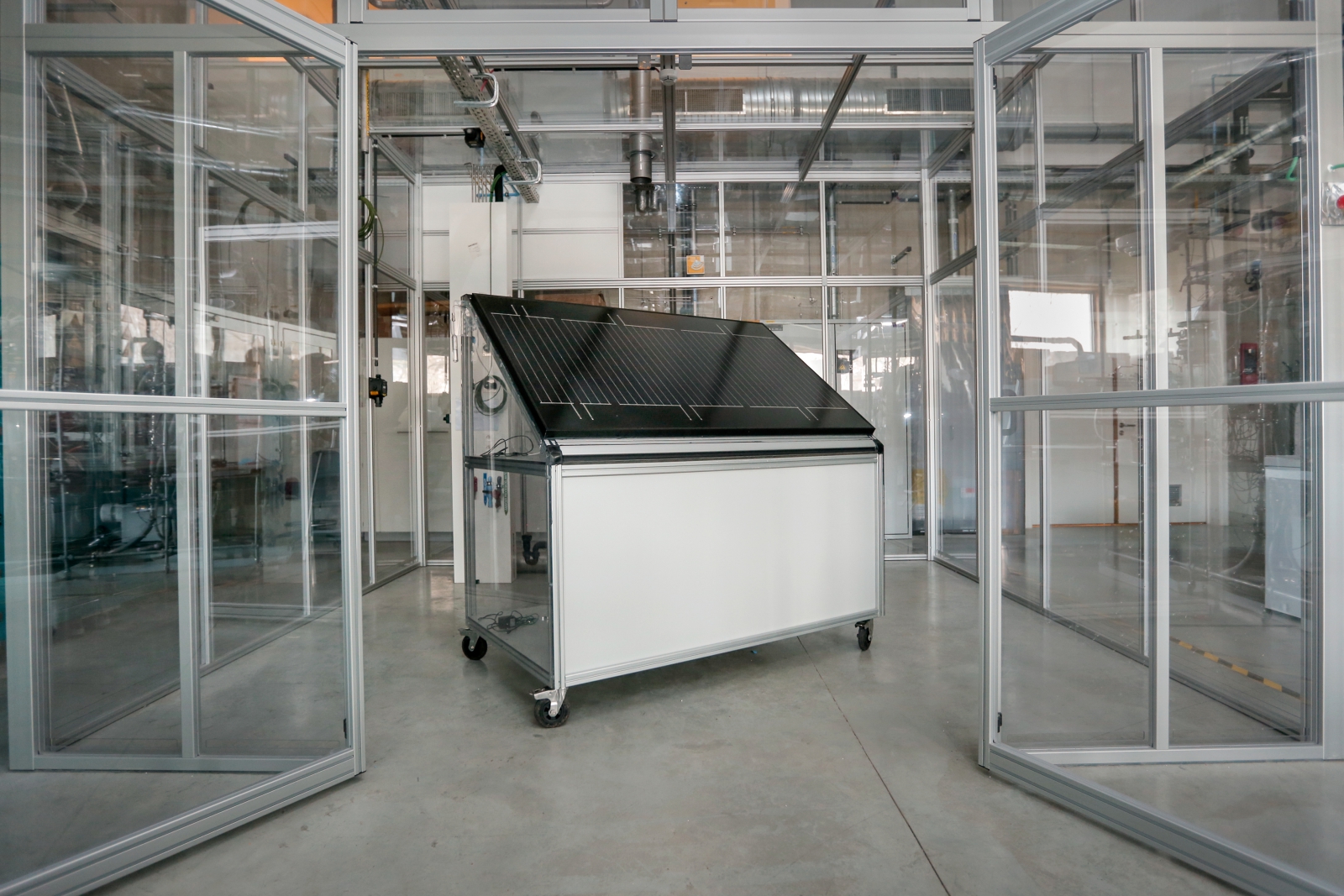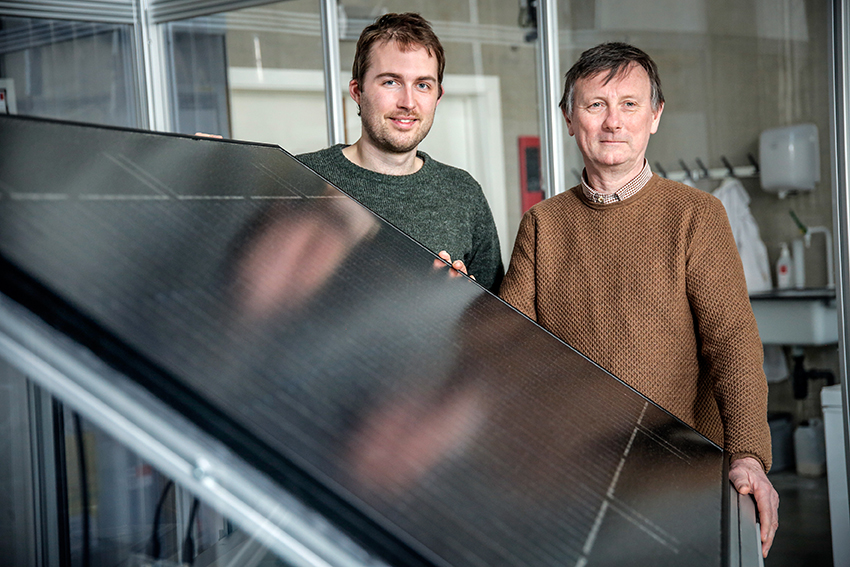Image: Tom Bosserez (left) and Johan Martens (right) with the solar panel (copyright KU Leuven – Rob Stevens).
In a world growing fearful of unpredictable climate change brought on by global warming, we’re racing to find new and sustainable ways to meet our ever-increasing energy demands. Although solar panels have been around for over half a century, traditional light-based panels are still too inefficient for our burgeoning electrical appetites. However, researchers at KU Leuven may have come up with an alternative to the classic sunlight-to-electricity panels: a solar panel that produces hydrogen gas using only sunlight and water vapor.

Image: The KU Leuven hydrogen gas panel (copyright KU Leuven – Rob Stevens).
Why aren’t we already using hydrogen gas?
Hydrogen gas is a naturally occurring gas typically created by separating water (H2O) into oxygen (O2) and hydrogen (H2). The energy market has been interested in using hydrogen gas for years: it is a good source of energy that can easily be converted into both electricity and heat. Hydrogen isn’t a greenhouse gas or a toxic substance, meaning it is safe for the environment; compared with the current standard gases used for heating and electricity, hydrogen gas is in many ways superior.
The problem, so far, has been we haven’t had a good method for producing hydrogen gas. Currently, most hydrogen is created using energy from petroleum-based substances like oil and natural gas. Referred to as “grey” hydrogen gas, this method is not widely used for multiple reasons: it relies on unsustainable resources, it is difficult and expensive, and large-scale production in a centralized location presents logistical problems when it comes to storage and transport.
Most hydrogen gas is produced using oil and gas; not a big win for the climate or the environment. We believe this is about to change. – Jan Rongé, KU Leuven
Excitingly, the new Belgian hydrogen gas panel is capable of producing “green” hydrogen gas, where the sought-after gas is created using renewable energy sources (in this case, sunlight and water vapor). The panel needs very little of these resources to function efficiently and produce useful amounts of gas (after all, the panel was created in Belgium: not exactly a country renown for sunshine and warm weather).
A long time coming
The KU Leuven panel has been 10 years in the making, with incremental adjustments and improvements finally culminating in the record-breaking panel recently made public. In an interview with VRT, team leader Professor Johan Martens gave the following comment:
“It’s a unique combination of physics and chemistry. In the beginning, the efficiency was only 0.1 per cent and barely any hydrogen molecules were formed. Today, you see the hydrogen rising to the surface in bubbles. So that’s ten years of work – always making improvements, detecting problems. That’s how you get results.”
The whole system is very practical: hydrogen gas produced by a solar panel in the warmer months can be stored in an underground pressure vessel until winter. One family would only need about 4 cubic meters of storage space for a full winter’s supply: the same amount of space used for an average oil tank.
Ten years of work – always making improvements, detecting problems. That’s how you get results. – Johan Martens, KU Leuven
Though the substance is easy to convert into both electricity and heat, it does come with some drawbacks. Like most fuels, the gas is highly flammable. Like natural gas used in classic heaters, this volatility can pose a danger. However, unlike petroleum gas, propane or butane, hydrogen is a light gas. This means if there is a gas leak, it will rise and dissipate instead of posing a health threat by spreading along the ground. KU Leuven researcher Jan Rongé emphasized this: “The risk of accidents with hydrogen gas is no greater than with natural gas.”
The world is watching
The hydrogen gas panel is poised to revolutionize the clean-energy market: just twenty panels are powerful enough to provide an average family home will all their electricity and heating requirements for a whole winter season.
We wanted to design something sustainable that is affordable and can be used practically anywhere. – Johan Martens, KU Leuven
“The panel produces around 250 litres per day over a full year,” said engineer Jan Rongé. “Twenty of these panels produce enough heat and electricity to get through the winter in a thoroughly insulated house and still have power left. Add another twenty panels, and you can drive an electric car for an entire year.”
Last week, Toyota announced that it wants to produce hydrogen gas with another prototype designed by Johan Martens’s team.
“The benefit of hydrogen gas is that it can replace fossil fuels. Around 80% of our energy comes from oil, gas, or coal. We need to replace these sources if we want to tackle global warming”, said Jan Rongé.
Johan Martens agreed: “We wanted to design something sustainable that is affordable and can be used practically anywhere. We’re using cheap raw materials and don’t need precious metals or other expensive components.”
All eyes are on the KU Leuven team as they gear up for large scale production of their innovative hydrogen gas panel. Technological breakthroughs in energy production and sustainability are vitally important, now more than ever.


